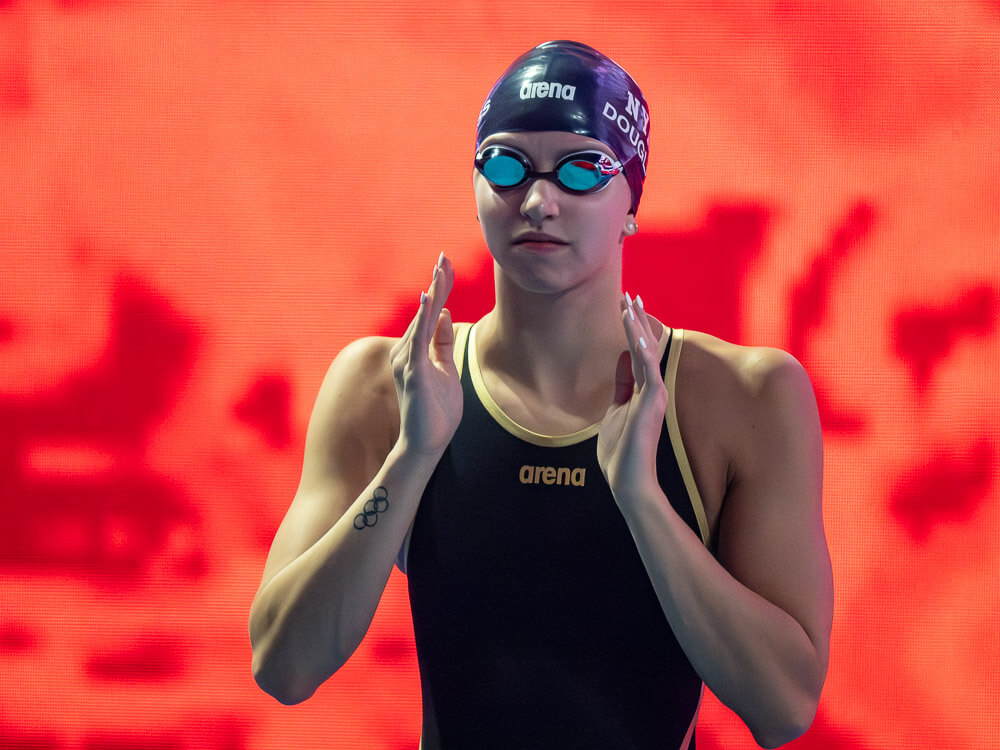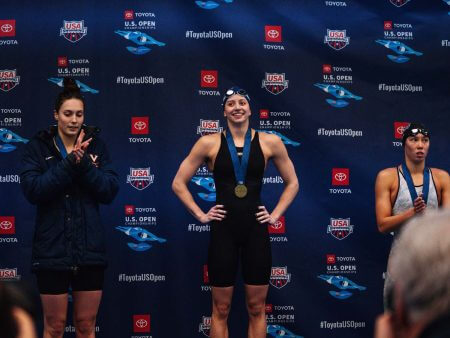Kate Douglass Could Tackle Daunting Schedule in Paris Pursuit

Kate Douglass Could Tackle Daunting Schedule in Paris Pursuit
When she swam at her first Olympics two-and-a-half years ago, Kate Douglass was a one-event swimmer, having only qualified to represent the United States in the 200 IM. After claiming Olympic bronze, she returned to college swimming for two final years at the University of Virginia, during which she established credentials as perhaps college swimming’s all-time most versatile performers, winning NCAA titles and swimming the fastest time ever in four different events.
And gradually, Douglass has expanded that range into long course. In 2023, she qualified for the World Championships in a combination of events that can only be described as unique: the 100 freestyle, 200 breaststroke and 200 IM. The crossover between the 100 free and 200 breast is so unusual that World Aquatics decision makers have placed the two events on the same day at each of the last 12 World Championships.
But Douglass swam both at this year’s Worlds, missing the medals by just a tenth in the 100 free and then, less than an hour later, winning silver in the 200 breast. Douglass also departed Fukuoka with 200 IM gold and four relay medals, and she is favored to take a central role on the U.S. women’s team at next year’s Paris Olympics.
Of course, as with any multi-event performer, schedule considerations must be part of the equation. A swimmer as successful as peak Ryan Lochte could not navigate a 200 backstroke-200 IM Olympic double, where the two finals were separated by less than a half-hour. Lochte held the world record in the 200 IM and won four consecutive world titles in the event, but largely thanks to the event lineup, he could never match up with Michael Phelps on the Olympic level.
So how does the schedule shape up for Douglass? Doable but potentially busy over the back half of the meet. The Olympic schedule runs for nine days, with eight morning sessions and nine finals sessions stretching from July 27 through August 4. The U.S. Olympic Trials schedule matches that format but excluding relays.
Douglass has established herself as a serious contender for an Olympic berth in five individual events: her three races from Worlds plus two others in which she finished third at this year’s U.S. Nationals, the 100 butterfly and 50 free. At the recent U.S. Open, just minutes an impressive 200 IM win, Douglass swam a best time of 24.38 in the 50 free to beat likely her three main competitors for Olympic spots, Abbey Weitzeil, Torri Huske and Gretchen Walsh.

Kate Douglass (center) between Alex Walsh and Torri Huske at the U.S. Open — Photo Courtesy: Emily Cameron
Here’s what Douglass’ day-by-day schedule would look like at both Trials and the Paris Games including all five individual events plus three potential relays:
Day 1 AM: 100 butterfly P
Day 1 PM: 100 butterfly SF, 400 freestyle relay F
Day 2 AM: off
Day 2 PM: 100 butterfly F
Day 3 AM: off
Day 3 PM: off
Day 4 AM: 100 freestyle P
Day 4 PM: 100 freestyle SF
Day 5 AM: 200 breaststroke P
Day 5 PM: 100 freestyle F, 200 breaststroke SF (plenty of rest)
Day 6 AM: off
Day 6 PM: 200 breaststroke F
Day 7 AM: 200 IM P
Day 7 PM: 200 IM SF
Day 8 AM: 50 freestyle P
Day 8 PM: 50 freestyle SF, 200 IM F, mixed 400 medley relay F (only five total races, not much rest)
Day 9 PM: 50 freestyle F, 400 medley relay F
The schedule would set up for four potential doubles, including on the last two evenings of racing. If Douglass qualifies for the Olympic team in the 100 fly, there would be a double between the semifinals of that event and the 400 free relay final. Four days later, she could race the 100 free final and 200 breast semis in one session, but the events will be separated by more than an hour in real time.
A potential issue emerges on night eight, when Douglass could race the 50 free semifinal, the 200 IM final and mixed 400 medley relay in one session with relatively little time between races. Racing both of those individual events could hurt the Americans’ medal chances in both medley relays but especially the mixed-gender event. Of course, relay qualification is dependent on which races Douglass manages a top-two finish at the Olympic Trials.
This lineup would give Douglass a whopping 18 races over nine days, one more than Phelps won in his eight-gold-medal performance at the 2008 Olympics, and only one day off. Of course, Douglass is far from guaranteed to qualify for the Olympic team in all of these events. Three individual races, just like this year’s World Championships, might be the most likely outcome, and based on the schedule, that would be manageable.
We’ll see what shakes out next summer, but Douglass has positioned herself for numerous event options in a potential second Olympic Games and plenty of medal chances for Paris.



